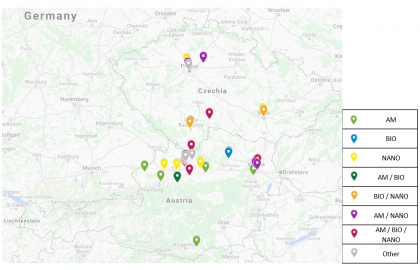Online Survey
The questionnaires collected together with PRO and USB and the direct questioning of companies participating in the survey clearly showed that the addressed topics nanotechnologies, biosensing and additive manufacturing and the combination of disciplines for applications in medical technology are not yet pronounced in the companies as a combined cross sectoral research and implementation topic is established and there is a corresponding need for cooperation in projects with researchers.
In particular, the implementation measures that are important for the survey in the course of project ideas as cooperative research tasks showed a variety of possible combinations not only in the target industry of medical technology, but also in the area of smart packaging or other industries such as mobility and smart manufacturing in mechanical engineering, where AM is currently more in after sales than is used in the implementation for components.
For this purpose, an analysis of the evaluation of the results was drawn up as a management paper, and additional requirements were identified and communicated from the company visits.
Competence Mapping
The competence map of the NABIAM project was created via Google Maps. The competences of the companies/institutes are categorized in 8 categories, which are Additive Manufacturing (AM), Biosensors (BIO), Nanotechnology (NANO), all the combinations within and a category for companies/institutes, which cannot be categorized into the above sections (Other).

NABIAM competence map is available using this link
Scientific Lectures
Key facts: 6 lectures in 3 series, 6 speakers, 130 participants
Lecture 1 (10.12.2020)Dr. Barbora Špačková, Chalmers University of Technology, Göteborg Dr. Yoojin Oh, Johannes Kepler University in Linz |
|
Lecture 2 (25.2.2021)RNDr. Ján Štěrba, Ph.D., University of South Bohemia, České Budějovice Prof. Peter Ertl, Ph.D., Technical University Wien |
|
Lecture 3 (23.6.2021)Ing. Libor Beránek, Ph.D., Czech Technical University in Prague DI Dr. Veronika Miron, Johannes Kepler University in Linz |
Webinars
Key Facts:
3 webinars on NABIAM topics (Nanotechnologies, Biosensors, Additive Manufacturing)
19 speakers presented in NABIAM webinars
10 speakers from Austria, 9 speakers from Czech Republic
9 companies and 10 research organizations presented
101 participants attended NABIAM webinars
400 minutes of webinar recordings
|
NABIAM Webinar on Nanotechnology Part 1 (22.4.2021) |
|
|
NABIAM Webinar on Nanotechnology Part 2 (22.4.2021) |
|
|
NABIAM Webinar on Biosensors Part 1 (27.5.2021) |
|
|
NABIAM Webinar on Biosensors Part 2 (27.5.2021) |
|
|
NABIAM Webinar on Biosensors Part 3 (27.5.2021) |
|
|
NABIAM Webinar on Additive Manufacturing Part 1 (16.9.2021) |
|
|
NABIAM Webinar on Additive Manufacturing Part 2 (16.9.2021) |
Project Ideas
In the last NABIAM project phase, to strengthen cross-border cooperation, several project ideas were elaborated based on available competences and survey analysis.
Four projects were initiated and made known for the partnership in industry and science in print media as well as through direct contact with relevant partners.
Projects ideas focus on transnational and scientific cooperation:
Project 1: Smart Packaging - Biocompatible sensors for food
The minimum shelf life of food is indicated by printing on packaging, the legal requirements are very rigid. This is definitely in the interest of the consumer - he should be on the safe side when it comes to the expiry date for minced meat or milk. However, the flawless edibility of food can deviate significantly from this date. Biocompatible sensors integrated into the packaging can detect the shelf life of food in real time. You communicate with both the customer and the shelf attendant and determine how long the food is actually and unquestionably edible - the waste of food can thus be reduced.
Project 2: Nanostructured blood pumps
Mechanical pumps can support the mechanical performance of the heart. So far, they have been made from precious metals using subtractive manufacturing. The challenge is the surface of these components: the surface can damage blood cells, the cavitation of the fluid blood can damage the component, and the components can also cause thrombosis. Nanostructuring the surface of the ceramic pumps manufactured using additive technologies can circumvent these negative physical effects. Thanks to the intelligent components, the blood does not “notice” that the pumps are foreign bodies. The flow of the blood remains exclusively laminar, the pump can work in the "optimal operating state".
Project 3: Bio-based structures for wounds
A massive injury to the skin - for example in the case of a pressure ulcer - requires close observation of the wound and its ongoing care. A bio-based, printed wound structure is intended to replace this. A 3D bio-scaffold that is precisely adapted to the patient, including sensors, should achieve two things 1. Tissue structure: The “component” creates a living space for the growth of healthy cells. 2. Monitoring: the bio-sensor system detects germs and warns of possible infections in good time.
Project 4: Nanostructured light guides made of plastic
The fourth project idea extends far beyond applications in the life sciences. Opto-electronic sensors can be used in medical technology as well as in components that enable autonomous driving. Nanostructured light guides can represent a quantum leap in sensor technology. Nanoimprint lithography, which PROFACTOR has been researching and developing for a decade, replaces the subtractive etching in silicon layers that is common in semiconductor technology.
Links
NABIAM network is still active. Follow us on social media.
Contact us if you want to get more info about results or NABIAM network.
info@nabiam.eu

